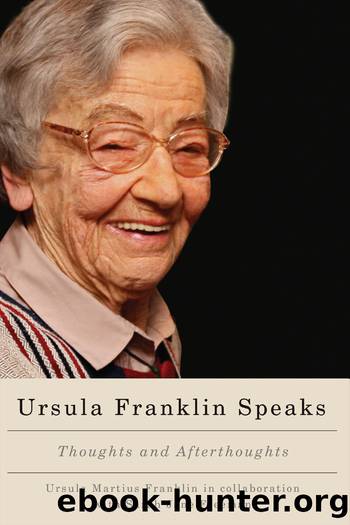Ursula Franklin Speaks by Franklin Ursula Martius;Freeman Sarah Jane;

Author:Franklin, Ursula Martius;Freeman, Sarah Jane;
Language: eng
Format: epub
Publisher: McGill-Queen's University Press
13
Developing a Li of Massey
(Acceptance speech, Massey Collegeâs 40th Anniversary Awards, University of Toronto, 2004)
It is a great privilege for me to speak on behalf of my fellow award winners and to thank all who have been part of conceiving of this honour. Probably the first reaction for each of us, when learning of this honour, was the question âWhy me?â Certainly I can think of many within the Massey community who could rightfully stand in my place tonight, and my fellow award recipients assure me their response has been just the same.
We are thus here, not as much as âExhibit A,â but as a delegation that happened to be in town and that belongs to a much larger contingent. Members of such a contingent might be recognized, not so much by what they do, but how they do it: it is their conduct that would identify those who could stand in our place.
The term conduct is used here in the sense of the Chinese notion of Li. John Fraser and I share an interest in and respect for the philosophy of ancient China, and I would like to highlight a few elements of the very complex concept of Li so as to indicate the outline of a âLi of Massey.â From its Confucian roots, Li draws on respect for tradition, an understanding of the importance of ritual, of doing things properly, as well as a conviction of the centrality of music and beauty in public life. But there are other roots of Li. From its Mohist tradition comes the knowledge that appropriate conduct is not a matter of prescription or of following meticulously a set of given rules; the right conduct is a matter of discernment â a process of ongoing weighing and assessment.
âBe awareâ is a central and recurring dictum in the teachings, and being aware does not mean constantly looking out for mad dogs or terrorists. It means be aware of what is going on around you and respond to it with what the texts call âthe standards of mutual concern.â In todayâs parlance one would say, âBe forever mindful of the wider context within which you are called to live and work. Respond to it with knowledge, compassion and integrity.â
The Chinese texts also speak of âmutual concern.â This awareness of an essential reciprocity is vitally important in terms of proper conduct. Those who try to educate must be prepared to be educated; those who attempt to help have to accept help equally willingly. That is not easy for the likes of us, yet it is part of an emerging Li.
Vincent Del Buono reminded me of the title of Vincent Masseyâs autobiography Whatâs Past Is Prologue. What a phrase! I do not know how Mr Massey would have responded to the question âPrologue to what?â but in terms of our experience at this, the fortieth anniversary of the College, the past is the prologue to the unforeseen, or even more so â to the unforeseeable.
This is where
Download
This site does not store any files on its server. We only index and link to content provided by other sites. Please contact the content providers to delete copyright contents if any and email us, we'll remove relevant links or contents immediately.
CCNA Cisco Certified Network Associate Exam (200-301): Technology Workbook by IP Specialist(494)
Learning First, Technology Second by Liz Kolb(477)
Passionate Readers by Pernille Ripp(465)
Presenting: The Professor's Guide to Powerful Communication by Norman Eng(461)
The SEO Book: Search Engine Optimization 2020, Free SEO Audit incl., Way to Nr. 1, SEO and SEM by Tobias Ebner & Granitza Levin(424)
Guide to Teaching Computer Science by Orit Hazzan Tami Lapidot & Noa Ragonis(398)
Google Classroom: 2019 User Manual to Learn Everything You Need to Know About Google Classroom by Class Alexa(381)
The Math(s) Fix: An Education Blueprint for the AI Age by Wolfram Conrad(365)
Web-Based Learning by Gayle V. Davidson-Shivers Karen L. Rasmussen & Patrick R. Lowenthal(345)
Advanced Apple Debugging by 2018(344)
Research on Mathematics Textbooks and Teachers’ Resources by Lianghuo Fan Luc Trouche Chunxia Qi Sebastian Rezat & Jana Visnovska(344)
Guide to Teaching Puzzle-based Learning by Edwin F. Meyer Nickolas Falkner Raja Sooriamurthi & Zbigniew Michalewicz(314)
Video in the Age of Digital Learning by Jonas Köster(308)
Computational Thinking in the STEM Disciplines by Myint Swe Khine(302)
Creativities, Technologies, and Media in Music Learning and Teaching (Oxford Handbooks) by Gary E. McPherson & Graham F. Welch(297)
Digital Workplace Learning by Dirk Ifenthaler(297)
Digital Tools in Urban Schools: Mediating a Remix of Learning by Mahiri Jabari(271)
Deeper Learning With QR Codes and Augmented Reality by Monica Burns(264)
Best Technologies for Public Libraries by Christopher DeCristofaro(261)
